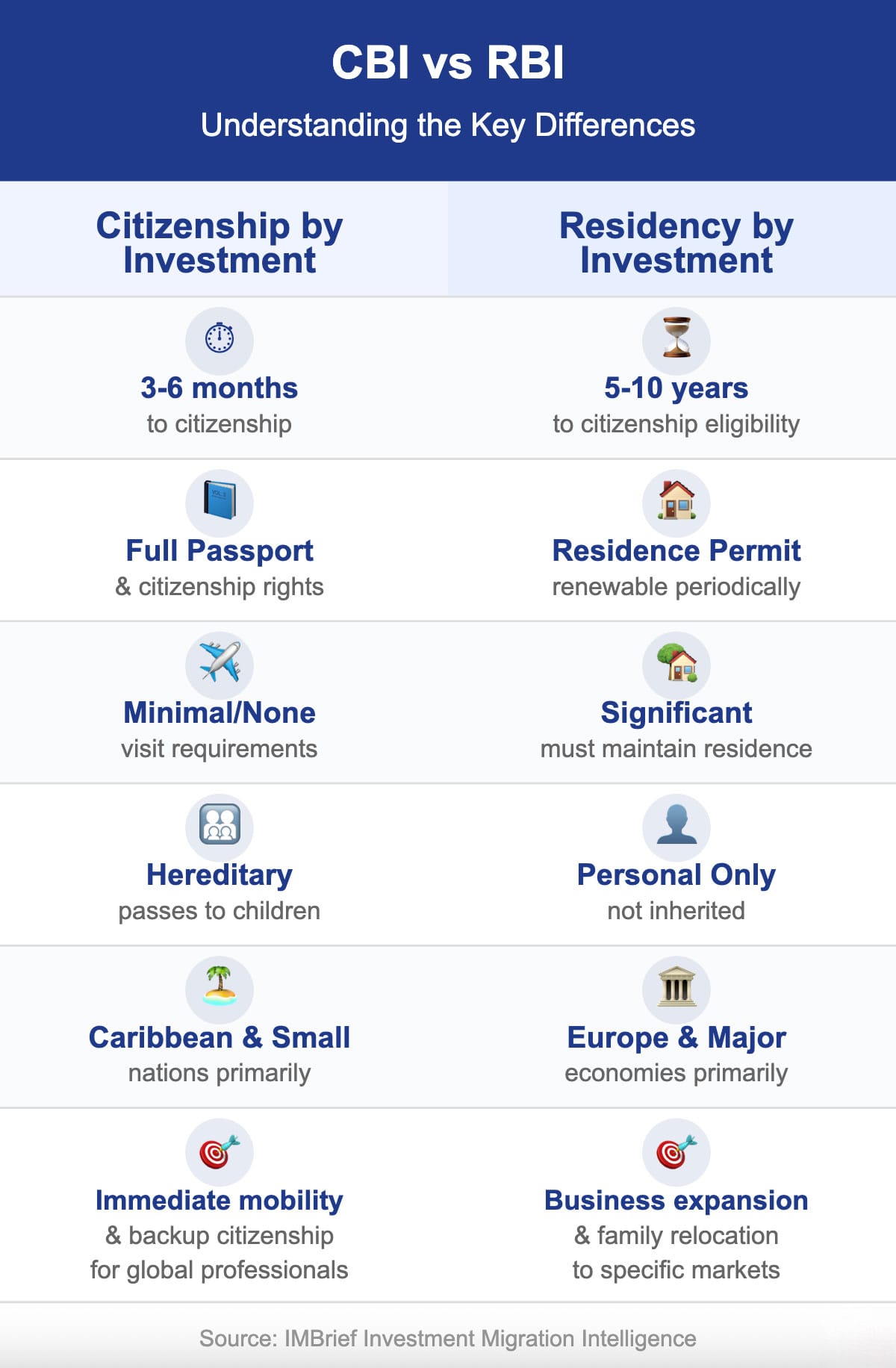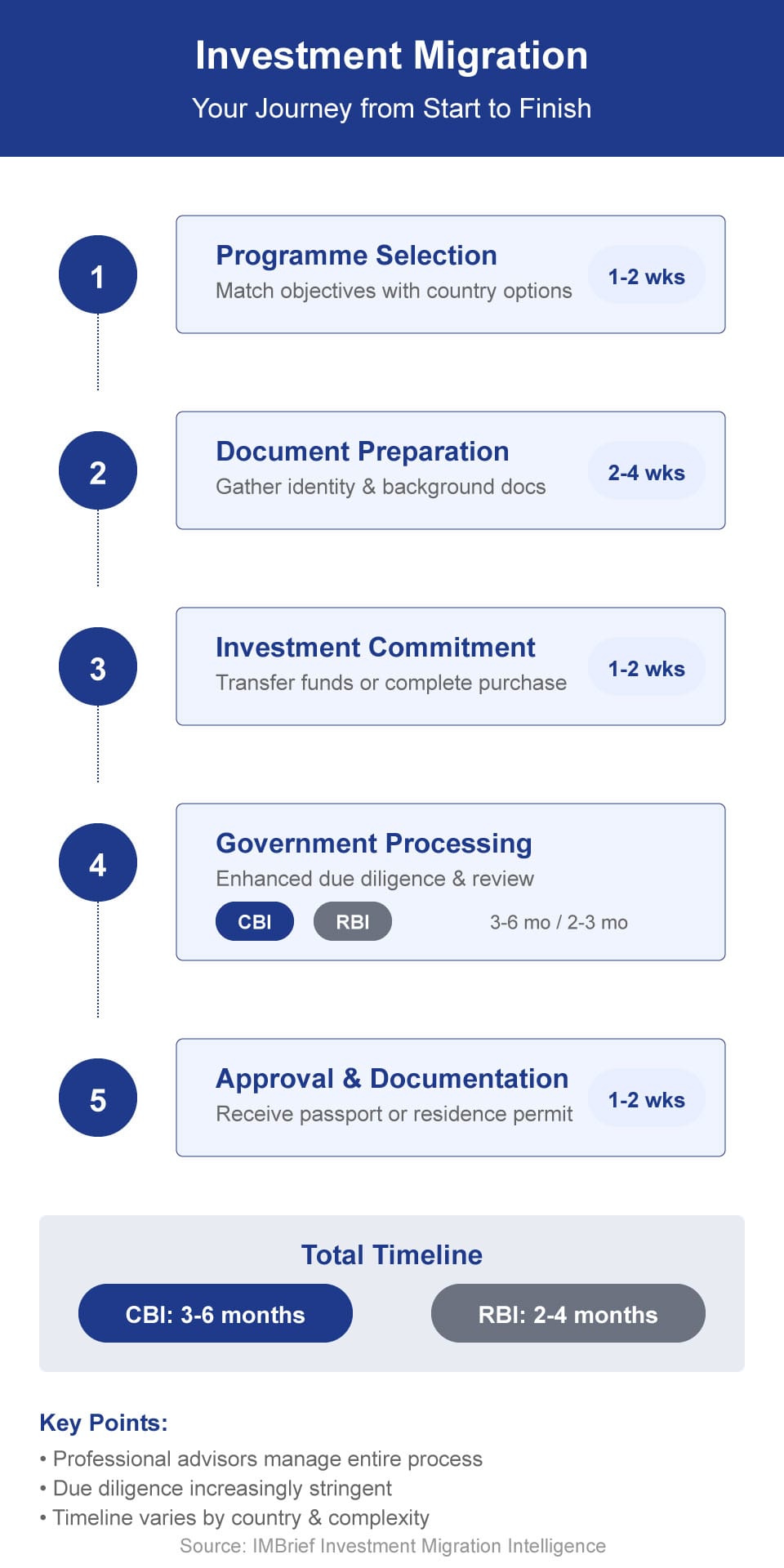Investment migration has evolved from what could be considered a niche wealth management instrument into a mainstream strategy for global investors seeking greater mobility, security, and opportunity. However, there’s still quite a lot of confusion about what investment migration actually entails, how it differs from traditional immigration routes, and whether it genuinely merits serious consideration.
Our guide provides a clear explanation and understanding of investment migration. We’ll distinguish the difference between the two primary forms (Citizenship by Investment and Residence by Investment), and evaluate investment migration’s relevance to both your personal and professional objectives.
Understanding Investment Migration
Investment migration at its core is simply a series of legal programs that allow you to obtain citizenship or residence rights through qualifying investments in the program’s host nation.
In contrast to conventional immigration routes, which are based on employment, family ties, or humanitarian grounds, investment migration creates a direct economic relationship between you and your chosen jurisdiction.
The Critical Distinction: CBI versus RBI
Grasping the difference between Citizenship by Investment (CBI) and Residency by Investment (RBI) programs is vital for making well-informed strategic choices.

Citizenship by Investment (CBI)
CBI programs deliver the most comprehensive outcomes: full citizenship and a passport from the host country.
This typically includes:
- Immediate citizenship status (usually within 3-6 months)
- Full passport privileges, including visa-free travel benefits
- No or minimal physical presence requirements
- Hereditary rights that can be passed to future generations
- Political rights, including voting (in most jurisdictions)
Today, CBI programs are predominantly offered by smaller nations with a few notable exceptions. The majority are located in the Caribbean, where they work as important sources of foreign investment and government revenue.
Residency by Investment (RBI)
RBI programs grant temporary or permanent residence rights, with a potential route to citizenship through naturalisation. The key characteristics of an RBI program include:
- Residence permits that require periodic renewal
- Rights to live, work, and study in the host country
- Access to social services (this varies by program)
- A potential route to citizenship after meeting residency requirements
- Generally, more stringent physical presence obligations than CBI programs
European nations offer some of the most attractive RBI programs, often termed "Golden Visas,". These programs can lead to permanent residence and eventual citizenship eligibility.
Who Benefits from Investment Migration?
Investment migration serves distinct professional and personal objectives. The most common beneficiaries include:
The Global Entrepreneur
Entrepreneurs establishing international operations can benefit from investment migration's flexibility. In contrast to regular business visas with restrictive conditions, investment migration can deliver the freedom to pursue multiple ventures while maintaining global mobility.
The International Portfolio Investor
Executives and professionals managing interests across multiple jurisdictions find investment migration essential for reducing travel friction. A Caribbean CBI passport, for instance, can provide visa-free access to over 140 countries, eliminating potential bureaucratic delays.
The Family Strategist
Parents who prioritise educational and career opportunities for their children can use investment migration to secure access to the world’s leading educational systems and job markets. European RBI programs, in particular, excel in providing these long-term educational and career benefits to families.
The Risk Manager
Citizens living in politically or economically volatile regions view investment migration as critical contingency planning. A second citizenship or residence right can provide a potential escape route during times of uncertainty.
How Investment Migration Works
The investment process follows a structured framework, though the specifics will vary by program and host nation:

Your Journey:
- Program Selection: Match your personal objectives with program offerings
- Due Diligence Preparation: Assembling your documentation, proving identity, source of funds, and demonstrating a clean background
- Investment Commitment: You make the qualifying investment (donations, real estate, bonds, or business investments)
- Application Processing: This is a government review and can include enhanced due diligence checks
- Approval and Documentation: You receive your citizenship certificate/residence permit
Professional investment migration advisors and practitioners typically manage this complex process. They will be invaluable in helping to maintain conformity with increasingly stringent due diligence requirements.
Aspects Investors Need To Consider
Financial Commitment
The investment thresholds between programs vary significantly. Caribbean CBI programs typically start from $200,000-$300,000, while European RBI programs will require €250,000-€500,000 or more. Beyond the actual investment, you need to consider processing fees, professional services, and ongoing obligations.
Time Investment
CBI programs generally offer the fastest route to a second passport (3-6 months). Conversely, RBI programs typically provide immediate residence rights but require multiple years of physical presence before citizenship eligibility. You will need to align your program choice with your timeline and objectives.
Tax Implications
Proceeding with investment migration can trigger complex tax considerations. Some of the most popular jurisdictions offer favourable tax regimes for new residents, while others may require additional reporting obligations. You should always seek professional tax advice before committing to any program.
Reputation and Compliance
Program integrity varies considerably. Well-managed programs with robust due diligence work to protect their reputations and maintain their international visa-free agreements. You should research a program’s track record and any recent regulatory changes before proceeding; you want to avoid investing in a country that may suddenly have its visa-free access blocked.
The Strategic Value Proposition For Investment Migration
Investment migration delivers benefits well beyond being an elaborate travel visa:
- Business Growth: Easier access to new markets with reduced bureaucratic friction
- Educational Access: Broad educational opportunities for children without the complexity of international student restrictions
- Healthcare Security: Easier access to advanced healthcare systems during medical emergencies
- Lifestyle Design: Greater freedom to choose where to live based on quality of life rather than existing nationality-based limitations
- Succession Planning: The ability to transfer your assets and benefit multiple generations
Making the Decision To Invest
Moving forward with any investment migration program represents a significant financial and personal decision.
Consider these factors:
- Define Clear Objectives: What specific problems do you need your investment migration program to solve?
- Evaluate Alternatives: Could you achieve the same objectives via a conventional immigration route?
- Assess Program Stability: How have any recent regulatory changes affected your target programs, or is there discussion about impending changes in the news?
- Calculate Total Costs: Don’t get caught out by unexpected additional costs. Calculate all fees, taxes, and personal expenses in your analysis.
- Engage Qualified Advisors: Work with licensed professionals who can demonstrate expertise and experience with both the source and destination jurisdictions.
The Investors Perspective
Investment migration has evolved from its exotic wealth preservation origins into a mainstream strategy for today's international citizens.
The industry's shift towards enhanced due diligence and regulatory compliance improves program integrity while maintaining core value propositions.
For anyone managing a complex international lifestyle, investment migration can deliver beyond traditional immigration in terms of certainty, speed, and flexibility. Whether you’re seeking immediate global mobility through a Caribbean CBI or long-term European residence leading to citizenship, investment migration can deliver a structured pathway.
The question is no longer whether investment migration has value; the billions in foreign investment have clearly established that. The question is whether that value meets your specific circumstances and objectives.

